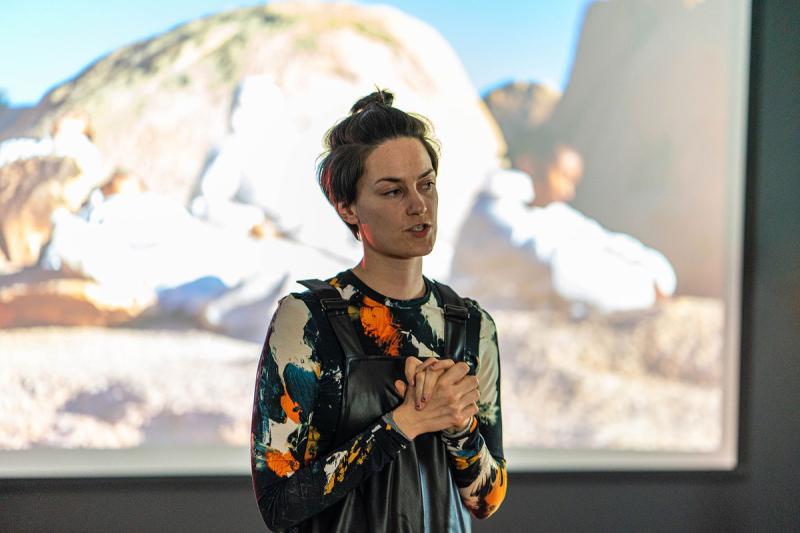Isabel Beavers is a transdisciplinary artist and creative producer based in Los Angeles. She creates installations, public art, and digital experiences that explore the climate crisis, technology, and ecological justice. Her installations incorporate all of the senses to create immersive experiences for the viewer. She hopes to encourage new ways of thinking about the future. In 2020, Beavers co-founded the Great Pause Project, an open-source archive documenting the COVID-19 pandemic experience. She is Manager of Artistic Research with SUPERCOLLIDER and Youth Development Specialist with artworxLA. She holds a B.S. from the University of Vermont, and an M.F.A from School of Museum of Fine Arts at Tufts University.
The AICAD/NOAA Fisheries Art + Science Fellowship provides a hands-on opportunity for recent graduates. They apply their art and design education to ecological and social concerns and address them by connecting communities around challenging resource issues.
Beavers will complete a 6-week residency with NOAA Fisheries during June–July 2021. She will then have a 6-month period from August 2021 to February 2022 off-site to research, produce, and distribute creative work.
Conserving Nearshore Habitat
The 2021 Fellowship will focus on working with communities in Puget Sound to conserve nearshore habitat crucial to recovering salmon and killer whales. The health of nearshore habitat depends upon the land-management decisions of individual landowners across Puget Sound. Isabel will work with NOAA Fisheries to deepen connections and collaboration with landowners through artistic and cultural strategies, helping shape restoration efforts and accelerate recovery.
The selection committee was comprised of several artists and NOAA Fisheries professionals, including:
Stephanie Littlebird Fogel: Stephanie is a Kalapuyan visual artist, professional writer, and curator from Portland, Oregon. Drawing connections between our collective past and imminent future, Fogel mixes her own tribal traditions with contemporary materials and subject matter. A graduate of the Pacific Northwest College of Art, she was selected as the first AICAD/NOAA Fisheries Art + Science Fellow in 2020.
Jane Marsching: An interdisciplinary artist, Jane explores our past, present and future human impact on the environment through collaborative research-based practices. She has sited projects in museums and galleries as well as weather observatories, public parks, city streets, radio waves, and the internet. She has worked with scientists, educators, kite builders, meteorologists, architects, and musicians, among others. Recent exhibitions include: Sun Valley Center for the Arts, Ketchum, Idaho; University of Massachusetts, Boston; Northern Spark, Minneapolis, MN; Kilroy Metal Ceiling, Brooklyn; Galerie Lucy Mackintosh, Lausanne, Switzerland; Tierra des Explorades, Buenos Aires; and Mass MoCA.
John Longchamps: John is the Founder of Longchamps & Company – an interdisciplinary firm with a strong dedication to upholding principles of sustainability and belief in the power of human potential. He earned a BFA in Industrial Design from Kendall College of Art and Design and completed a MA in Sustainable Design at Minneapolis College of Art and Design. His practice is specialized in design, innovation, and research for the development of products, services, systems, and experiences.
Elizabeth Babcock: Elizabeth is the North Puget Sound Branch Chief for NOAA Fisheries West Coast Region. She manages a team that conducts Endangered Species Act consultations to conserve listed species and habitat. Her branch is responsible for salmon recovery plan development and implementation, stakeholder collaboration, Federal Power Act engagement, and tribal relations.
Michael Milstein: A Public Affairs Officer for NOAA Fisheries West Coast Region, Michael helps tell and explain stories of science and management. A former newspaper reporter at The Billings Gazette and The Oregonian, as well as numerous other newspapers and magazines, Milstein reported on issues such as salmon recovery, water management in the West, and conservation of forests and rivers.



